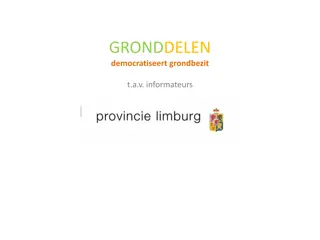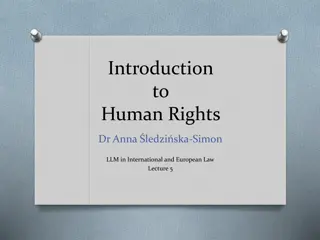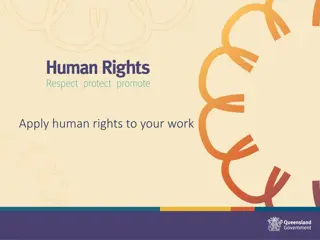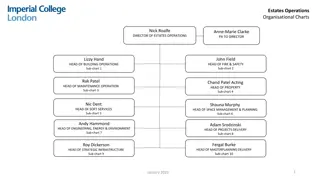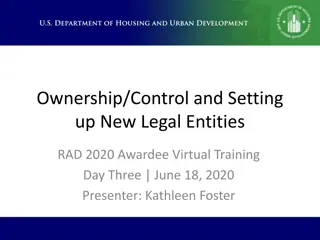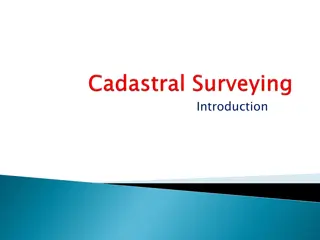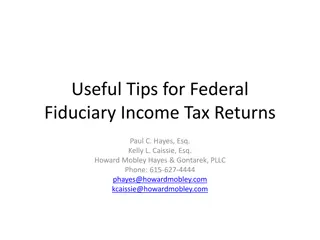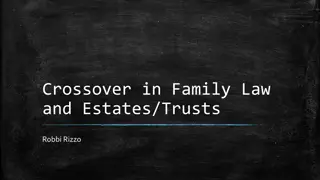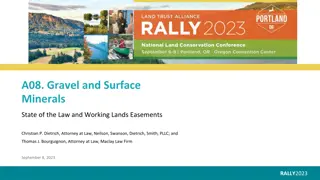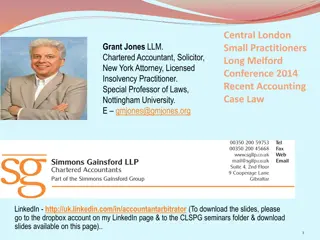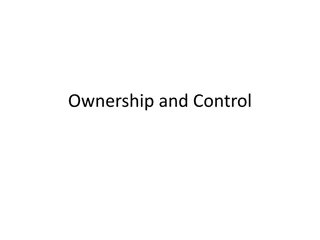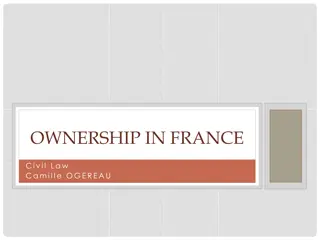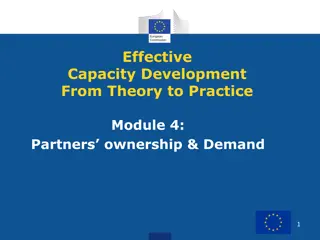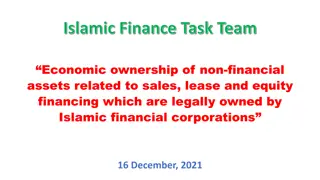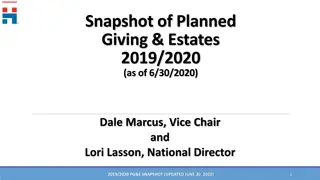Estates and Ownership Rights
Estates in land offer various rights, with fee simple ownership being the most comprehensive. Learn about the different types of estates, such as life and future estates, and the limitations and implications associated with each. Explore how ownership rights transition between fee simple, life, and future estates.
Download Presentation

Please find below an Image/Link to download the presentation.
The content on the website is provided AS IS for your information and personal use only. It may not be sold, licensed, or shared on other websites without obtaining consent from the author.If you encounter any issues during the download, it is possible that the publisher has removed the file from their server.
You are allowed to download the files provided on this website for personal or commercial use, subject to the condition that they are used lawfully. All files are the property of their respective owners.
The content on the website is provided AS IS for your information and personal use only. It may not be sold, licensed, or shared on other websites without obtaining consent from the author.
E N D
Presentation Transcript
Estates are interests in land An estate provides a possessor with all the rights associated with tenures (mainly the right to occupy) as well as an interest in a property Estate ownership is the most common form of ownership today There are 5 types of estates, namely fee simple, life, future, lease and use
Absolute right in real property; highest estate in terms of rights It provides the most exercisable rights over land with a minimum number of limitations Fee simple owners can, enter, gift or lease land
Fee simple ownership has five limitations: 1. Taxes, failure to pay which your property may be taken away 2. Interference by police 3. Government s right to regulate including the right to change zoning limiting use 4. Escheat - the government may take away land if its owner dies and there is no heir to take it 5. Expropriation by government for public use
Owners of life estates exercise ownership rights over the estate till their death Ownership rights for life estates are granted for the period of a lifetime Second highest right over property
If a fee simple owner gives his father a life estate for a particular property, once the father dies, the property will return to the fee simple owner The father will be able to exercise ownership rights, including the ability to use or lease the property, up until the point where he dies Upon his death, interest in the property will revert back to the son
Future estate is an interest that arises in property once the life estate ends When the life estate owner dies, the future estate becomes the fee simple owner of the property If a son grants his father a life estate and mother a future estate, once the father dies, the mother will become the life estate. Upon the mother s death, the son will become the fee simple owner
A fee simple owner grants a life estate to his wife and a future estate to his children. If the fee simple owner dies before his wife and children, they will share 50-50 ownership of the estate In case an estate is jointly owned, if a single party wishes to lease or sell the estate, they will need the consent of the other parties
Leasehold estate grants rights for a limited period of time Once the lease comes to an end, the estate expires Tenants typically have a number of rights during their lease term, but once their leases expire, they have no rights with regards to the property
Estate to Uses allows use of property but it does not confer ownership rights It is a onetime method for holding lifetime ownership For instance, if a person gives a property to his mother to stay in as long as she needs to without paying any rent or monetary compensation. Once she leaves or dies, the property will return to the fee simple owner This estate is not used anymore
What is the best description of fee simple? Highest rights, fewest limitations What kind of estate is a life estate? Life = life; life estate lasts for a lifetime When can a future estate sell property without consent? On death of fee simple owner, future estate becomes fee simple What happens if lease contract in place from when wife had life estate and child had future estate, and wife dies after contract is made? Kid becomes fee simple owner and can evict tenant Contract becomes void if life estate or future estate dies
Husband is a fee simple owner. He has the most rights with the least number of limitations. He can own, lease, use, gift or sell land or anything, except: Police can interfere Government can expropriate Government can raise taxes If husband dies without a will, life estate and future estate will get 50-50 share in ownership life is wife, future are kids
If life estate and future estate have 50-50 share of the property, one party may not sell or lease it without consent of the other If the life estate owner dies, the future estate owner will become fee simple owner It operates as a cycle
Concurrent ownership arises when two or more persons have ownership of a property at the same point in time There are two kinds of concurrent ownership, namely joint tenancy and tenancy in common
Joint tenancy is typically between husband and wife Survivorship operates in joint tenancy, which means that if one joint tenant dies, their rights transfer to the remaining joint tenant(s) Since joint tenancies are governed by the survivorship principle, wills do not operate in joint tenancy
Joint tenants do not have a share of interest each joint tenant has 100% interest in the property The four PITT unities must be present for a joint tenancy, namely possession, interest, time and title If the four PITT conditions are not met, the tenancy is a tenancy in common
Equal Possession: Each joint tenant is entitled to equal possession of the property, i.e. the full property Joint tenants may not exclude one another from possessing any part of the property Equal interest Each joint tenant has equal and identical interest This means that a fee simple owner and a leasehold owner cannot be joint tenants
They collectively own 100% of the property; there are no shares If one party dies, the other is entitled to 100% of the property Time The joint tenants must have acquired their interest in the property Equal Title The joint tenants must get their identical interests in land from the same document (typically a tenancy deed)
Under tenancy in common, you own a share in the property Survivorship does not apply, and tenants can leave their share to anyone through a will Only unity of possession is required for tenancy in common It is a common arrangement between friends and business partners


